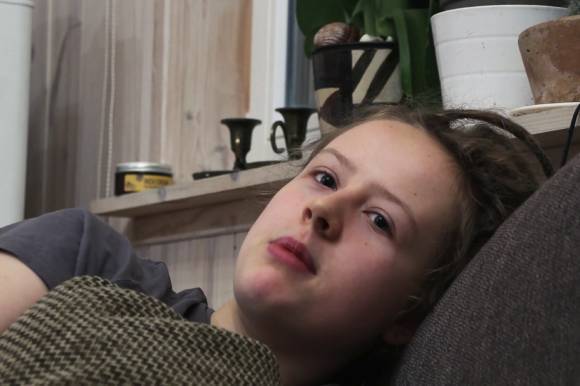


Margit Lillak: Becoming Roosi

Three generations. The protagonist, teenager Roosi, her mum and dad, divorced – and the one who writes this review, a senior citizen and a film blogger who hopes for a better world and believes in change coming from young ones like Roosi, who grew up in a commune, not a good place for a child, she says in one of the clips Margit Lillak brings from the film she made from the commune, “The Circle”. Roosi moved from the commune and lives with her mother.
Margit Lillak has followed Roosi for ten years from when she was 8 years old. You see that in the film, the connection from the director to her protagonist is close, the director is in the picture several times, once when parents call her to say that they can’t get hold of her… when she is in Germany thanks to a scholarship she has obtained to be in a Robert Bosch school in Freiburg Germany (from the school’s website: … “About 200 students from all over the world live and learn together for two years, exploring how they can contribute to a more peaceful and sustainable world.”
Will get back to the Bosch school… before that in the film you see Roosi as a very energetic “early” teenager, who takes photos and performs in dancing. From my opinion on a very skilled level. It’s her way of expressing herself, it’s fresh and joyful as is her participation in demonstrations for a better climate. In that way she follows her mother, a climate activist, but with an optimism, whereas the mother has a dark view on in which way the world is going. Roosi demonstrates creative skills, is this the direction she goes, I asked myself with hope, nodding to the fine sofa sequences, where mum and daughter discuss and mostly disagree – and tease each other, i.e. Roosi teasing her mother.
It changes in Freiburg. We don’t really get to know the school and its pedagogy but we see Roosi cutting her dreadlocks; is the film saying that she is getting into “normal”, no fun any more, it is serious business. Being in Freiburg means getting a diploma that can be used later in her life. An important dialogue she has with her mother concerns her visit to an anarchist camp, where she was attracted to the view – contrary to her mother. the hippie’s – that advocating for a better climate has to include a change in the way societies are built. She states this in a dialogue with her mother, who still thinks that Roosi (also) should focus on achieving skills for manual work.
If I got it right Roosi, after Freiburg, was now interested in getting one more scholarship to go to the US. Subject: Society, Politics, Economy? I am not a spoiler but the film suggests at the end that this could be the way that Roosi, no longer a wild joyful teenager could take. Politician?
No objection, I write this on the day where Donald Trump is to be inaugurated as President of USA for the next four years…
Margit Lillak has made an important film about a young Estonian/European teenager – well she is probably not that age any longer – now a young woman, who has the talent to make change happen.
The film has a straight forward, with a few flashbacks to the commune time – Lillak has made a strong loyal-to-Roosi film, easy to follow, that with Roosi herself contributing with many cellphone shots strongly to a film that can travel. A fine non-prestigious film for all three generations.
The film is shown at the Festival in Trieste these days. GO!
Estonia, 2005, 93 mins.